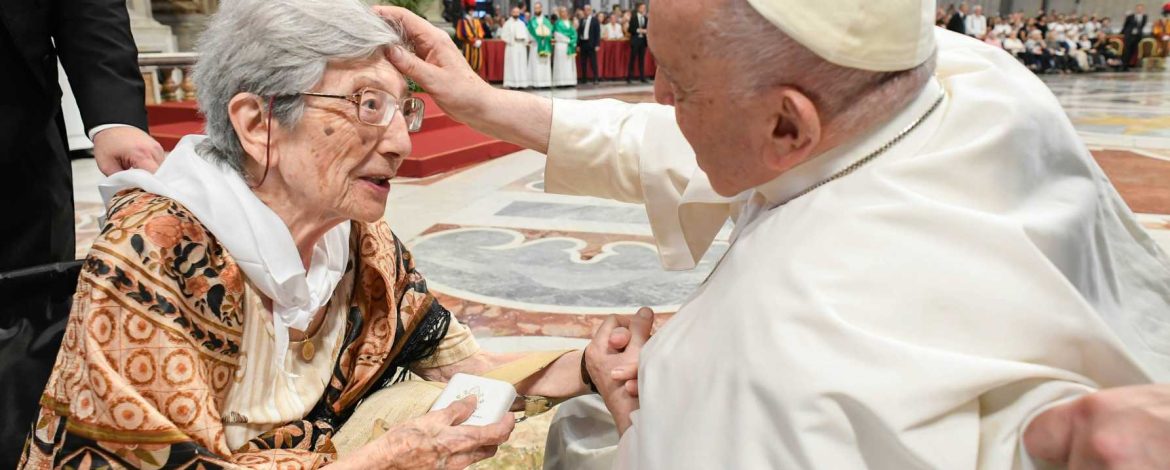Pope Francis has called the people of God from every part of the world to be supportive and caring to grandparents and the elderly who in many situations are accompanied by loneliness. In his message ahead of the fourth World Day of Grandparents and the Elderly to be marked Sunday, July 28, the Holy Father condemned the act of marginalizing the elderly persons saying, “God never abandons his children, never!… let us show our tender love for the grandparents and the elderly members of our families.”
The Pontiff pointed out that loneliness for the elderly and grandparents especially in poor countries can come about as a result of forced emigration of their children and ongoing conflicts in these countries. Besides, he said that solitude and abandonment have become recurrent elements in today’s social landscape and have multiple roots.
“In cities and villages devastated by war, many elderly people are left alone; they are the only signs of life in areas where abandonment and death seem to reign supreme,” reads part of the message released Tuesday, May 14, as it adds further, “The elderly find themselves alone because their children are forced to emigrate.”
“In some cases, they are the result of calculated exclusion, a sort of deplorable “social conspiracy”; in others, tragically, a matter of an individual’s personal decision. In still other cases, the elderly submits to this reality, pretending that it is their free choice,” the Pope said noting that “we have lost “the taste of fraternity” (Fratelli Tutti, 33); and we find it difficult even to think of an alternative.”
He underscored that some people blame the elderly for sorcery or rather use of supernatural powers for misfortune to befall the young people, a belief which results in resentment from the elderly.
“In other parts of the world, we encounter a false belief, deeply rooted in certain local cultures, that causes hostility towards the elderly, who are suspected of using witchcraft to sap the vital energies of the young; when premature death or sickness, or any other misfortune strike the young, the guilt is laid at the door of some elderly person,” Pope Francis disclosed and continued, “Yet if we think about it, this accusation that the elderly “rob the young of their future” is nowadays present everywhere. It appears under other guises even in the most advanced and modern societies.”
He referenced a situation where people are convinced that the elderly are burdening the young with the high cost of the social services that they require, “Diverting resources from the development of the community and thus from the young.” “This is a distorted perception of reality. It assumes that the survival of the elderly puts that of the young at risk, and that to favour the young, it is necessary to neglect or even suppress the elderly,” the pontiff narrated pointing out that, “Intergenerational conflict is a fallacy and the poisoned fruit of a culture of conflict. To set the young against the old is an unacceptable form of manipulation.”
She stressed that “What is important is the unity of the different ages of life, which is the real point of reference for understanding and valuing human life in its entirety” (Catechesis, 23 February 2022). Highlighting further the aspect of loneliness, Pope Francis said that in the current society, many women and men seek personal fulfilment in a life as independent as possible and detached from other people.
“Group memberships are in crisis and individualism is celebrated: the passage from “us” to “me” is one of the most evident signs of our times. The family, which is the first and most radical argument against the notion that we can save ourselves by ourselves, has been one of the victims of this individualistic culture,” reads the Pope’s message in parts as it continues, “Yet once we grow old and our powers begin to decline, the illusion of individualism, that we need no one and can live without social bonds, is revealed for what it is.
Indeed, we find ourselves needing everything, but at a point in life when we are alone, no longer with others to help, with no one whom we can count on. It is a grim discovery that many people make only when it is too late.” He called the people of God to emulate the Moabite woman in the Scripture, (Ruth), who challenged her customs and told her mother-in-law Naomi who wanted her and Orpah to return to their native towns and their homes (Ruth 1:8) when she said, “Do not press me to leave you” (Ruth 1:16).
“Ruth’s freedom and courage invite us to take a new path. Let us follow in her footsteps. Let us set out with this young foreign woman and the elderly Naomi, and not be afraid to change our habits and imagine a different kind of future for our elderly,” the Pope said adding, “May we express our gratitude to all those people who, often at great sacrifice, follow in practice the example of Ruth, as they care for an older person or simply demonstrate daily closeness to relatives or acquaintances who no longer have anyone else.
The Pope concluded his message for the fourth World Day for grandparents and the elderly saying, “Let us show our tender love for the grandparents and the elderly members of our families. Let us spend time with those who are disheartened and no longer hope in the possibility of a different future. In place of the self-centered attitude that leads to loneliness and abandonment, let us instead show the open heart and the joyful face of men and women who have the courage to say “I will not abandon you”, and to set out on a different path.”
Sr. Jecinter Antoinette Okoth, FSSA



Leave A Comment